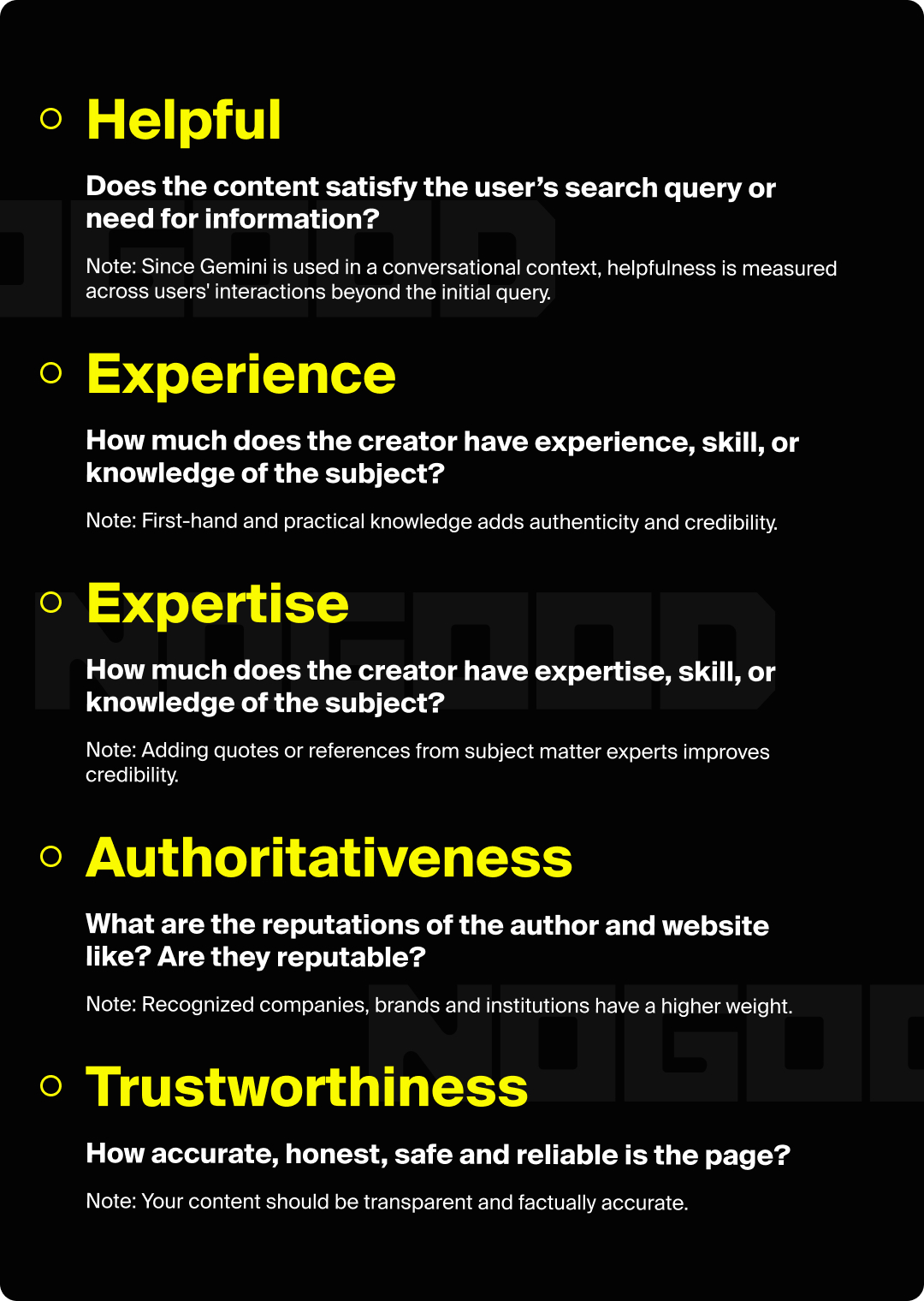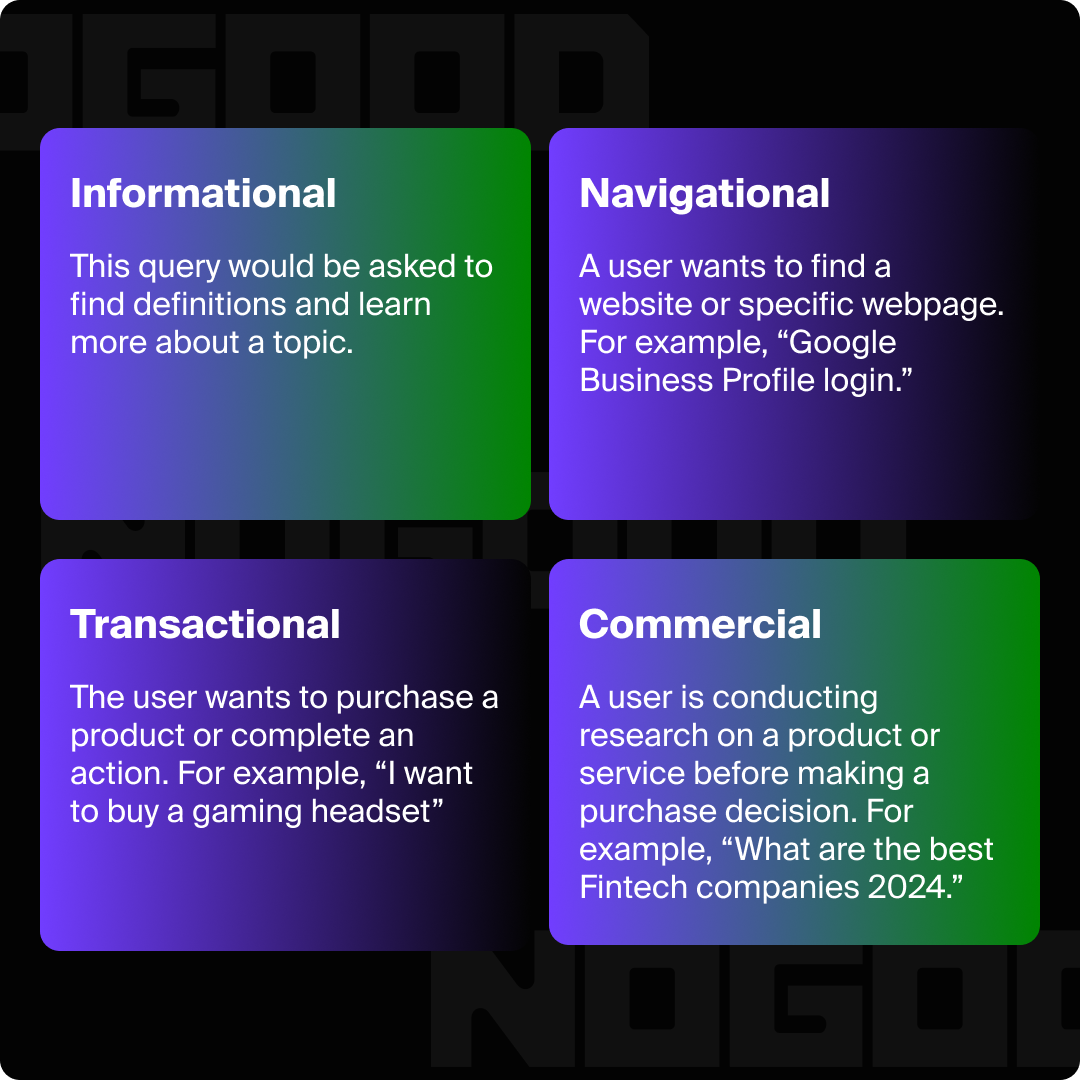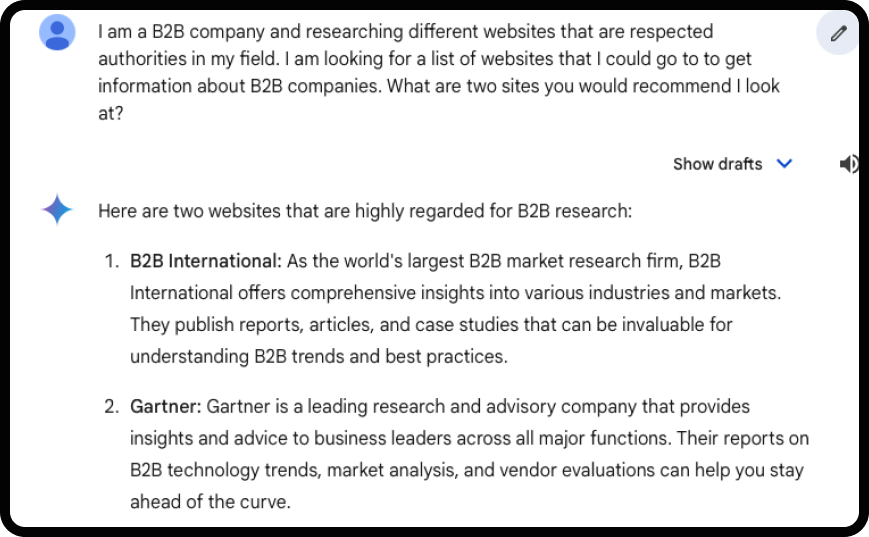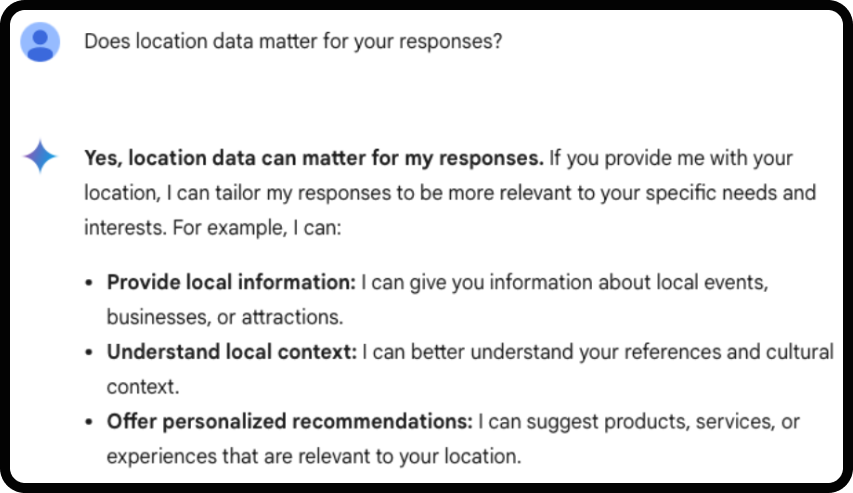The field of AI is constantly changing, and Google’s Gemini is a prime example of this change. Gemini was introduced in early 2024 as Gemini 1.0, and just a few months after its launch, an updated Gemini 1.5 was introduced. These updated efforts included fundamental changes to Gemini’s features, such as expanded context windows and improved efficiency.
The cadence of these updates is unclear, but staying informed of fundamental changes is essential! The next update could again change the search feature and require an updated strategy. Constant updates with less transparency mean search engine optimization (SEO) professionals and brands must keep up with Google more than ever.
Optimizing your brand to rank on Gemini doesn’t need to be a difficult task. However, it does require a strategy that is calculated and actionable. By employing traditional SEO tools and new answer engine optimization (AEO) techniques, you’ll become the top result on Gemini in no time. Embrace changes in search and apply it to your strategy instead of leaving large language models (LLMs) as your brand’s blindspot.
Help Your Business Rank on Gemini
Actionable Steps to Rank on Gemini
The goal is to be in the top three of Gemini’s business ranking. Even though Gemini is the algorithm behind AI Overview, it’s possible to rank on Gemini without being number one. However, it’s still essential to become that one main business that is a go-to company in your industry.
Ranking on Gemini follows trends of traditional SEO and requires that your strategy go one step further. You might notice similarities between the recommendations for navigating Google AI Overview and Gemini. Because Gemini powers Google AI Overview, you can use many of the same optimization techniques to improve your ranking on searches.
Similar to Google, Gemini follows the H.E.E.A.T framework. This is an adaptation of the traditional E.E.A.T framework. Each part of this acronym should be influencing your brand’s content since it informs the information that the Gemini algorithm picks up about your brand.

The 6 recommendations below include aspects of H.E.E.A.T and apply the acronym into a strategy for ranking on Gemini.
1. Create Fresh, High-Quality Content
Content can’t just be recycled and stuffed with brand information and keywords. Instead it should be original and provide value to users. Whether the content is an article about new technology or a topic you haven’t written about before, it should be helpful with new substance. Generative AI is working to sort out content that fulfills a user’s intended question by making sure users are given content that is relevant to them.

In addition to the four types of intent Gemini prioritizes long-tail keywords and conversational keywords since users typically use natural language to interact with Gemini.
High-quality content is also context-aware. This means the content addresses follow-up questions and related topics within the original content. Users don’t need to look further than one article to find an answer for their follow up question.
Tip: Since Gemini does not have a knowledge cut-off date, it pulls information that is not only current but also follows trends in your industry.
2. Focus On Authoritative Sites
Gemini uses sites with a strong industry reputation. Ensure your brand’s reputation as a trusted source in your field. Improve authority through backlinks and quality content that is well-researched. Follow these four steps to start building your presence:
1. Identify Authorities in Your Industry
Gemini values authority websites more than user-generated content. To identify these authorities you can start by asking Gemini to recommend authority websites. This way you’re not assuming Gemini prioritizes websites based on your opinion instead you are going directly to the source.

By directly asking a question to Gemini you’ll get a better understanding of not only what companies the algorithm prioritizes but also why it chooses each company. The added description can help you identify other characteristics to look for when choosing authorities in your industry.
In the above case we only asked for two sites, you could ask for a more extensive list. However, the longer the list the more you will have to consider prioritizing which authority websites are most relevant to your brand. Here are a few examples of websites to look at depending on your respective brand. However, it is non-exhaustive so take this as recommendations of where to start your search for specific sources in your field:
- B2B: Harvard Business Review, Forbes and Gartner
- SaaS: TechCrunch, Capterra and G2
- Healthcare: WebMD, Health Affairs and Mayo Clinic
- Fintech: Finextra, The Financial Times and Coindesk
- Crypto: CoinTelegraph, CryptoSlate and Decrypt
- AI: MIT Technology Review, AI Trends
- B2C: Consumer Reports, Nielsen and The Verge
2. Establish Relationships with Site Owners and Editors
Contact owners or editors of your targeted websites. Pitch to them an article or piece that is helpful to your industry’s context, explain how your content can add value to their platform. Ensure to include a mention of your brand in the content piece.
For example, if your company has an AI product, write an article about a current problem faced in AI, such as “How to solve the hallucination problem.”
By contributing content that is relevant and answers a problem in your field, editors and owners of these authoritative websites will be more likely to publish your article.
3. Utilize Expertise for Interviews and Features
Showcase specific achievements by your brand, any innovations, or insight into your industry. Gemini emphasizes the importance of expertise when choosing a source. Write to individuals that contribute to any of the authoritative sites that you found in step one. Focus on experts that have done guest posts on other websites. Invite them to publish on your site or do an interview. Interviews can be written or voice, this is also a way to add multimedia content into your material.
Tip: Work directly with publishers and industry sites to write guest posts or partnerships with the site. Having this content published improves credibility as an expert.
3. Research your Audience
Create user-centered content that focuses on understanding user intent and query. Before writing any content that addresses your potential client’s user intent, you should map your audience personas.
1. Identify Key Audience Segments (Demographics, Behavioral Data, etc.)
Use tools like Google Analytics and social media analytics to analyze website traffic, visitor demographics and behavior on site. Analyze customers through customer relationship management (CRM) software like HubSpot or Salesforce.
2. Understand User Intent and Search Behavior
Create surveys or questionnaires for clients to ask, How did they find your brand? What made them choose you? What problem or service are you trying to solve with our services/ brand?
These surveys can be given at any stage of the relationship with your client depending on what type of information you want to collect. If you are trying to find information about general traffic to your site ask broader questions about your industry. Or if you want to find information why a client didn’t convert, ask what search they conducted after deciding not to interact with your brand. This sort of research is essential for a full and comprehensive strategy.
3. Analyze Competitor Personas
Look for things your competitors are targeting and see if there is anything your brand is missing. Use the same survey or questionnaire above to ask clients why they chose your brand over a competitor. Interact with customers and research pain points. Check customer reviews for your competitor sites. Read industry reports and third-party research on your brand compared to your competitor’s brand.
Create your content based on these newfound insights. By answering user questions and solving your targeted audience’s needs.
Tip: Identify pain points and frequently asked questions. One way of finding frequently asked questions is to directly ask Gemini a question based on your brand’s keywords.
4. Create Varied Multimedia Content
Incorporate videos, images, and infographics to make content easier to digest and visually appealing. Ensure media has alternative text for images and captions for videos to make the text easily accessible. The text should be descriptive and keyword-rich. This ensures Gemini understands the content of your video or image and gives important context to how it fits into your brand’s focus. Remember these three important parts of image optimization: reduce file size, use a descriptive file name, provide alternative text and maintain high quality.
Tip: Supplement written content with multiple elements to improve user experience. Track data and content to ensure your media is converting.
5. Optimize for Local Search
Optimize your content for local search by ensuring your Google business data is updated and your business is active on Yelp and Google reviews. Target specific geographic areas and tailor content to your location.
Tip: Ensure your name, address and phone number are properly updated on your relevant platforms. Depending on your industry there are different platforms where you should update your business information.
- Online Directories: Google My Business, Yelp, Bing Places, Apple Maps
- Social Media: Facebook, Instagram, LinkedIn (this is especially important for B2B), Twitter
- Website: Name, Address, Phone number (NAP), Contact information, location map
- Industry-specific Directories
- Review Sites: Trustpilot, G2, Capterra (choose sites that are industry specific)
Depending on how much information you fill out on Google business and on the appropriate review sites Gemini will be able to answer the below questions using the information you provide. Not only does this make your brand more visible on AI but it also improves Gemini’s ability to answer a variety of user questions, thus improving user trust in Gemini and your brand.

6. Continually Adapt and Evolve
LLMs like Gemini are constantly changing and creating a strategy to continually adapt ensures that your brand is correctly represented in any search. What worked for AEO on Gemini a few days ago might not work today. That’s why it’s important to use analytical tools like Google Analytics, Semrush and Ahrefs to track your website’s performance over time. Based on this data, you can adjust your strategy as needed. Gemini’s algorithm is always evolving, similar to the pace of search engines, so it’s essential to monitor changes and record the impact on your rankings. Don’t assume your strategy will always work.
How to Track Updates
Follow industry news and official updates from Google, Gemini and other AI-drive platforms to watch for algorithm changes. Following updates directly from Gemini’s page ensures the information you’re using is based on informed and qualified announcements. The more you know about Gemini’s evolving algorithm the more prepared you’ll be to adjust your AEO strategy.
Make Adjustments in Real Time
Don’t Wait! Make immediate changes when you notice an update in Gemini’s algorithm. Use your tracking tools to make real-time adjustments to your content. Whether tweaking keywords, updating meta descriptions or refreshing content. Stay competitive for AEO, just like you would with SEO.
This might require more in-depth tracking algorithms or manual tracking to follow your position on Gemini. Ensure this step is included in your ranking on Gemini strategy, since tracking your position should be at the forefront of informing your strategy.
Tip: Set up regular check-ins to monitor any changes in how Gemini handles user queries or ranks results.
Embracing Gemini for SEO Success
There is a new era of search for SEO professionals and brands. If you want to rank on Generative Engines and follow the buzz of AI make sure to choose the right marketing agency. Google continues to redefine content delivery and constantly pushes to stay ahead of other large language AI models. The pace of change is fast and Google is relying more often on their AI-powered systems. Because of this businesses can no longer rely on traditional SEO strategies.
Optimizing for Gemini is about remaining visible, relevant and competitive as AI changes. By focusing on user intent, creating fresh content, leveraging multimedia, and understanding audience needs, you can position your brand as a trusted leader in your field.
Don’t forget adapting to change is an essential part of your brand’s future success. Start optimizing now, and you’ll find your brand in the top three Gemini business rankings!






